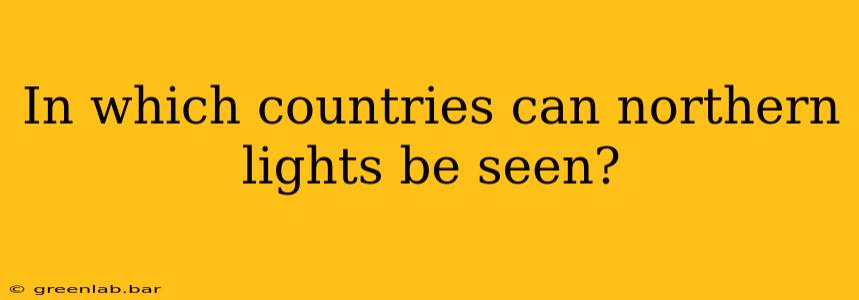The Northern Lights, or Aurora Borealis, are a breathtaking natural phenomenon captivating viewers worldwide. But where exactly can you witness this celestial display? This comprehensive guide explores the countries offering the best opportunities to see the aurora, factoring in viewing conditions, accessibility, and optimal times of year.
Understanding the Aurora Oval
Before diving into specific countries, understanding the aurora oval is crucial. This is a ring-shaped zone around the Earth's magnetic North Pole where the aurora is most frequently visible. The further north you are within this oval, the greater your chances of witnessing the lights. However, geomagnetic activity influences the aurora's reach, sometimes extending its visibility further south than usual.
Top Countries for Northern Lights Viewing
Several countries offer prime locations for witnessing the aurora borealis. These locations provide a balance of high aurora activity probability, accessible viewing locations, and supporting tourism infrastructure.
1. Norway: A Northern Lights Paradise
Norway consistently ranks among the best places to see the Northern Lights. Its northern location places much of the country well within the aurora oval. Popular viewing spots include:
- Tromsø: A bustling city offering various aurora tours and activities.
- The Lofoten Islands: Dramatic landscapes provide stunning backdrops for the aurora.
- North Cape: The northernmost point of continental Europe, offering unparalleled views.
Norway's well-developed tourism infrastructure ensures comfortable viewing experiences, with numerous hotels, tour operators, and aurora-viewing cabins available.
2. Iceland: Land of Fire and Ice, and Auroras
Iceland's unique geographical location and minimal light pollution contribute to exceptional aurora viewing. Locations like:
- Reykjavik: The capital city still offers decent viewing opportunities, especially on clear nights further away from city lights.
- Snaefellsnes Peninsula: A diverse landscape provides numerous secluded spots for optimal viewing.
- Jökulsárlón glacier lagoon: Witness the aurora dancing over icebergs—an unforgettable experience.
Iceland's accessibility and well-developed tourism make it a popular choice for aurora hunters.
3. Finland: Lapland's Magical Lights
Finnish Lapland, known for its snowy landscapes and reindeer herding, offers excellent opportunities for seeing the Northern Lights. Consider visiting:
- Rovaniemi: The official home of Santa Claus, also boasts impressive aurora viewing possibilities.
- Ivalo: A remote location providing dark skies and excellent aurora viewing chances.
- Saariselkä: Known for its wilderness and stunning natural beauty.
Finland combines stunning scenery with comfortable accommodation options, making it an attractive destination.
4. Sweden: Exploring the Aurora in Swedish Lapland
Swedish Lapland, similarly to Finnish Lapland, provides a magical setting for witnessing the aurora. Popular viewing locations include:
- Abisko National Park: Known for its exceptionally clear skies, often referred to as the "Blue Hole."
- Kiruna: A town nestled within the aurora oval, offering various tours and activities.
- Icehotel (Jukkasjärvi): Experience the aurora from a unique ice hotel setting.
5. Canada: Northern Lights over the Yukon and Northwest Territories
Canada's vast northern territories offer spectacular aurora displays. The Yukon and Northwest Territories provide excellent opportunities, though often requiring more travel to reach optimal viewing locations. Yellowknife is a popular hub for aurora viewing tours.
6. Alaska (USA): A Land of Auroras
Alaska boasts breathtaking landscapes and high probabilities of seeing the aurora, particularly during the winter months. Fairbanks is a well-established aurora viewing destination.
Factors Influencing Aurora Visibility
Several factors influence your chances of seeing the Northern Lights:
- Time of Year: Typically, the best time for viewing is during the winter months (September to April) when nights are long and dark.
- Geomagnetic Activity: Solar flares and geomagnetic storms can enhance aurora displays, making them more vibrant and visible.
- Light Pollution: Minimizing light pollution significantly increases the chances of witnessing a brilliant aurora. Dark skies are essential.
- Weather Conditions: Clear skies are a must for aurora viewing. Cloudy nights will obscure the lights.
Planning your trip with these factors in mind will greatly enhance your chances of witnessing this incredible natural wonder. Remember to check aurora forecasts before embarking on your journey!

